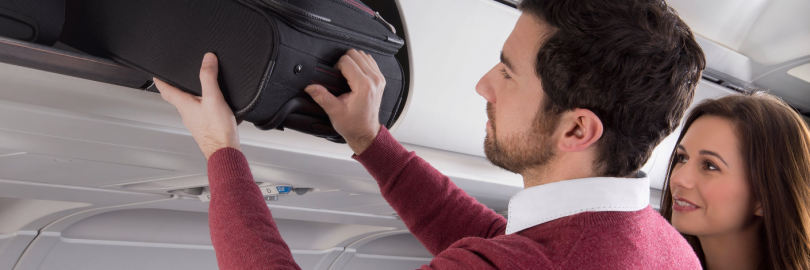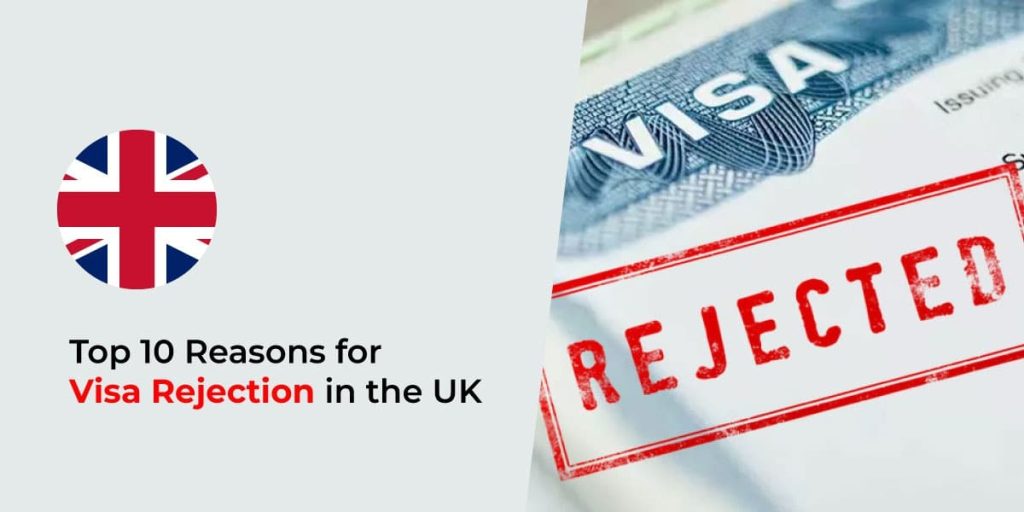Aircraft are now cross-border travel, work, and study, which are the necessary means of transport; each time you travel, in addition to the ticket’s attention, luggage is an essential factor. There are baggage requirements for air travel, not how much luggage you want to bring; different airlines have different baggage regulations. Today, we have compiled this summary of Ireland‘s airline baggage regulations, including Ireland Airlines carry-on baggage regulations, checked baggage regulations, free baggage allowance, excess baggage charges and other restrictions. Take a look!
Aer Lingus
Carry-on Baggage
If you want to take a 10kg carry-on bag on board and your booking does not include this bag, you must book a Priority Boarding Carry-On Bag online for €5.99/£5.99. Alternatively, you can book a free carry-on bag at the start of the check-in process. Alternatively, leave your bag at the check-in counter or baggage check-in kiosk (available in Dublin, Shannon, and London) at the start and collect it again at the baggage conveyor belt upon landing. This option is free of charge.
Note: If you bring 10kg of baggage to the gate and have not purchased a priority boarding carry-on, or it is not included in your booking, you must pay a fee of €35 to place this baggage in the aircraft’s cargo hold.

If your booking includes priority boarding carry-on baggage, you can check in with 10kg of carry-on baggage free of charge. Booking options that include a 10kg free baggage allowance are:
AerClub – Silver, Platinum and Concierge AerClub members
All Plus, Advantage, Aer Credit Card, AerSpace and Economy Class fares purchased through British Airways
Adults travelling with infants
Customers travelling to/from Aer Lingus transatlantic flights or connecting flights with interline partners.
All passengers travelling with Priority Boarding carry-on baggage (purchased or included) must check in online or via the app.
Baggage Size and Weight Restrictions
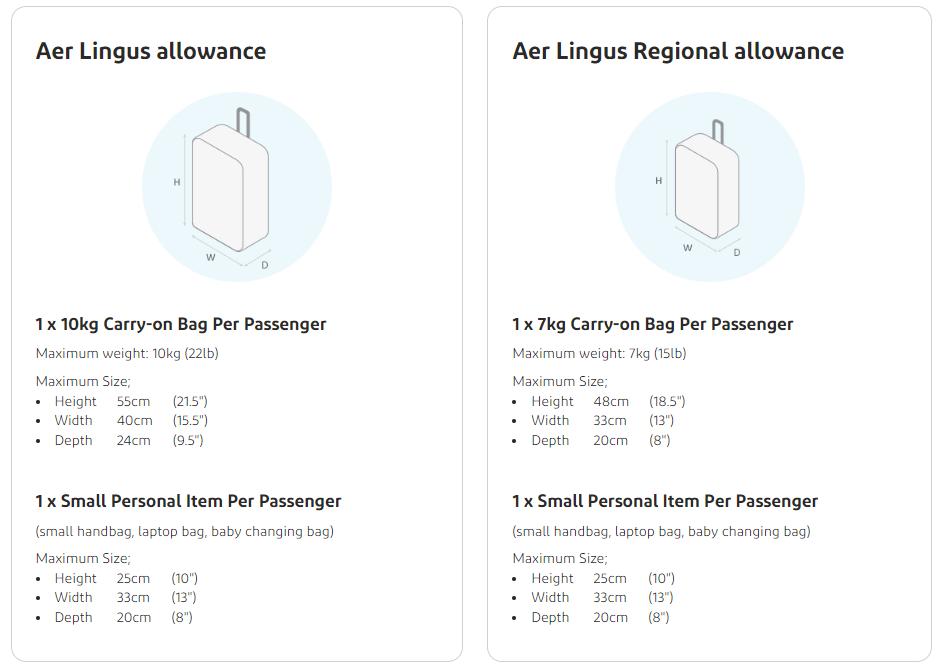
Checked Baggage
(i) Flights within Europe
Free Baggage Allowance
Three checked baggage options are available for flights within Europe:
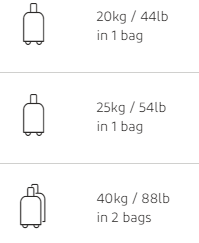
The maximum size of a single piece of baggage (length + width + height) = 158 cm (62 inches), and the weight of each piece of baggage must not exceed 32 kg/70 lbs. All fares except Saver include a 20kg free checked baggage allowance per passenger.
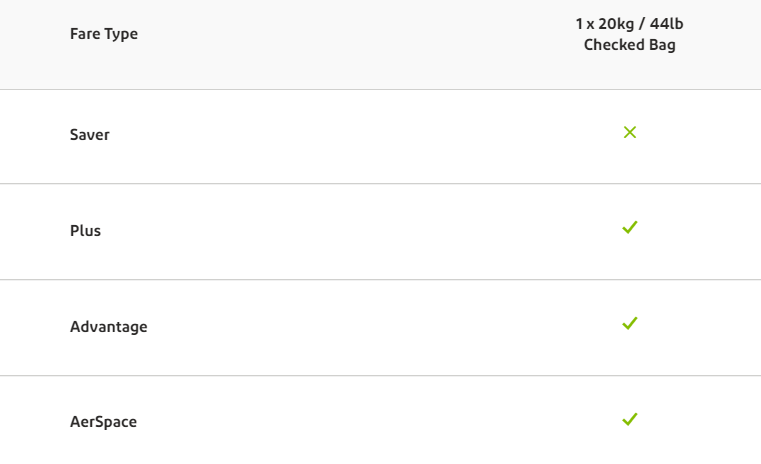
Note on checked baggage allowance:
The checked baggage allowance is calculated on a one-way basis per passenger.
Passengers travelling on Plus, Advantage and AerSpace fares are entitled to one free checked bag of 20 kg per passenger. Additional weight or extra baggage is subject to baggage charges.
Checked baggage charges apply to Economy Saver fares. The fee per weight piece is calculated according to the destination (near, medium or far) and the booking channel (online or at the airport).
Sharing or sharing the checked baggage allowance with travelling companions in the same booking and when checking in together is permitted.
An infant or child can bring a fully folding pram/stroller plus one of the following items free of charge: car seat, booster seat or travel cot.
If booking through a travel agent, don’t hesitate to contact them directly for your checked baggage allowance.
Checked Baggage Fees
Checked baggage fees vary depending on your route, type of fare, and when and where you book your baggage.
Booked with airline tickets:
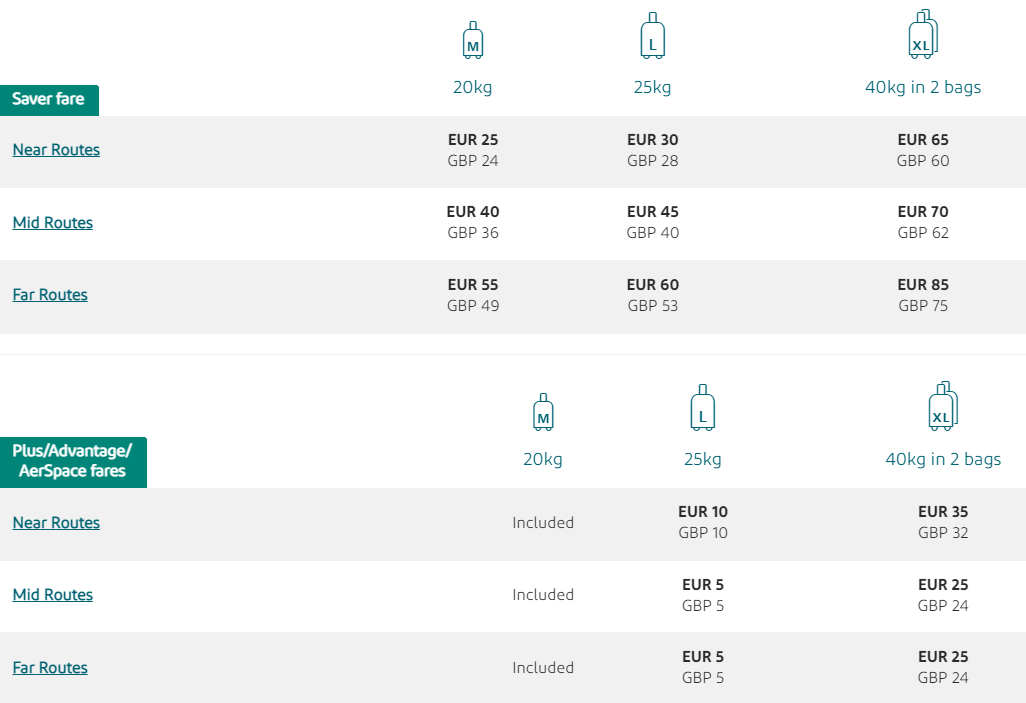
Trip management booking:
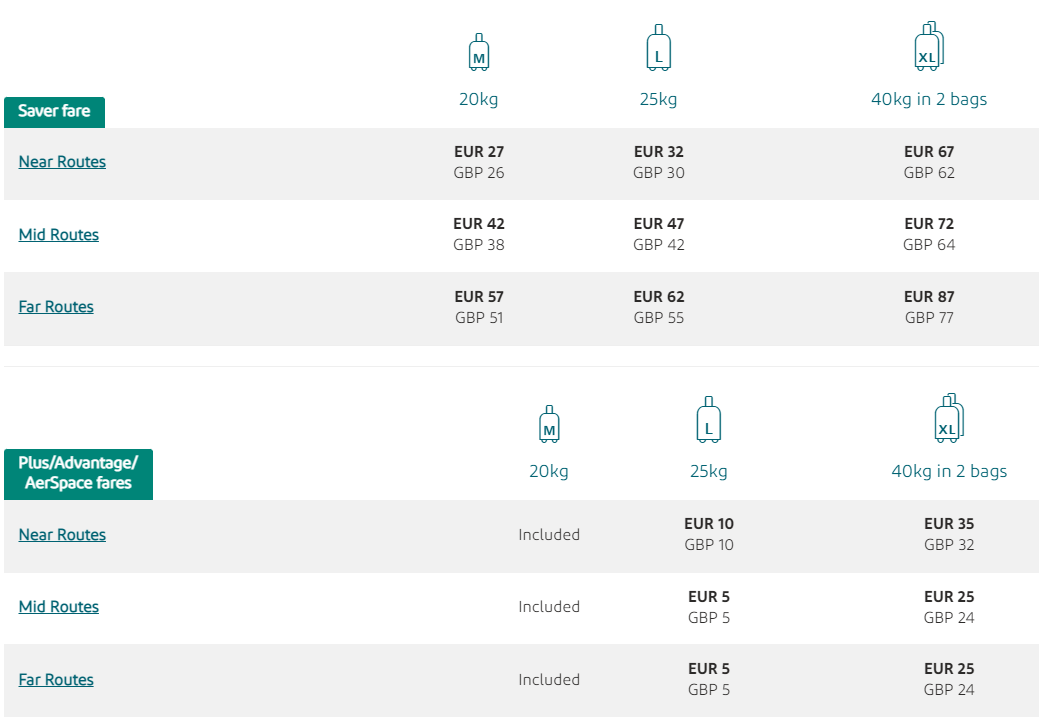
Airline call centre bookings:
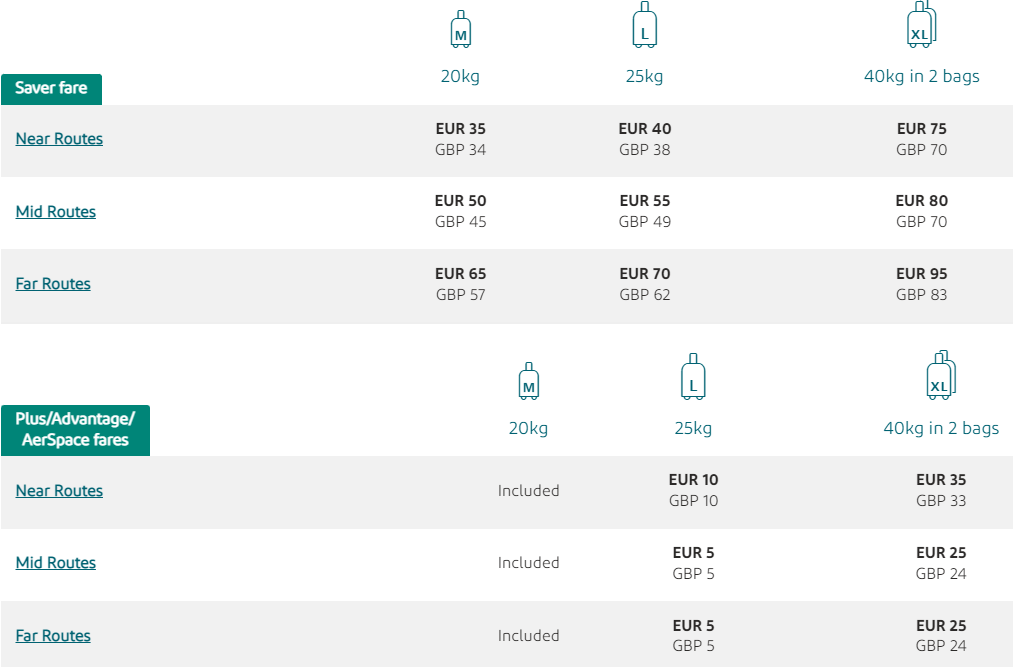
Airport Purchase:
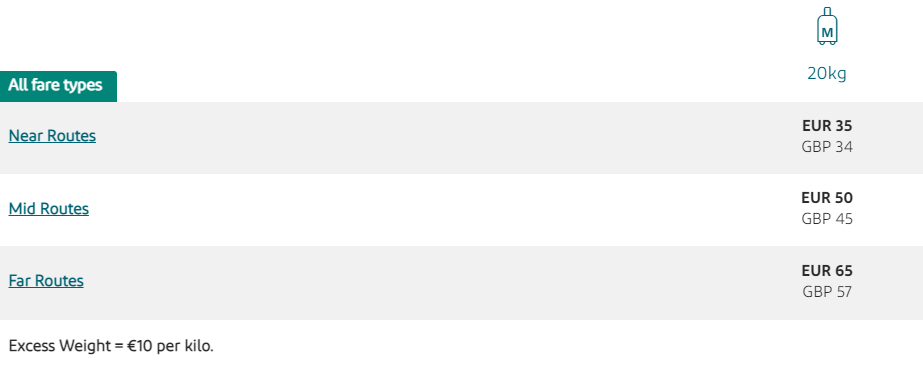
Excess Baggage Charges
If you choose not to pre-book your checked baggage and bring it to the airport for check-in, you will be charged the first 20kg of baggage allowance per passenger and the rate per kilogram for each additional kilogram thereafter.
If you add checked baggage to your booking but exceed your individual checked baggage allowance on arrival, you will be charged for excess baggage. Excess baggage is charged at a rate of €10 per kilo.
Customers are not permitted to upgrade their baggage to a higher weight at the airport on the day of departure, and the excess charge will apply to any weight more than the customer’s allowance.
(ii) Transatlantic Routes
Free Baggage Allowance
Three checked baggage options can be purchased on transatlantic flights:
The maximum dimensions of a single piece of baggage (length + width + height) are 158 cm (62 inches), and the weight of each piece of baggage must not exceed 32 kg/70 lbs. Smart and Flex fares include one piece of luggage of 23 kg (50 lbs.) per passenger.
Economy Class:
 Business Class:
Business Class:

Note on checked baggage allowance:
The checked baggage allowance is calculated on a one-way basis per passenger.
Passengers travelling on Smart or Flex fares benefit from one free checked bag of 23 kg (50 lbs) per passenger. Additional weight or baggage will be charged. A maximum of 2 additional bags can be purchased.
Business Class bookings include three pieces of checked baggage with a total of 69 kg (150 lbs).
Checked baggage charges apply to Economy Saver fares. The fee per weight is calculated based on the destination and booking channel (online or at the airport).
For Aer Lingus journeys between North America and the UK or Continental Europe, the transatlantic checked baggage allowance will apply to individual itineraries or all flights in the booking. For individually booked journeys, the relevant European or Transatlantic policies apply.
Each passenger is allowed a maximum of 3 bags per direction.
Combining or sharing checked baggage allowances is permitted when checking in with a travelling companion on the same booking.
For infant bookings (children under two years of age), a checked baggage allowance of 10kg/22 lbs is included in your booking. In addition, infants are allowed to bring one folding pram/stroller and one of the following items free of charge: a car seat, booster seat, or travel cot. Please see Special Items.
If you are booking through a travel agent, please get in touch with them directly for your checked baggage allowance.
Checked Baggage Fees
Book online:

Airport Purchase:

Excess Baggage Charges
Excess baggage charges apply to any additional checked baggage or weight over the permitted allowance, depending on the fare type. An additional fee will be charged if the weight exceeds the purchased weight.
The excess baggage charge for all baggage weighing between 23 kg and 32 kg (50 lbs and 70 lbs) is 75 EUR, 68 GBP and 100 USD. Baggage fees are non-refundable.
For more information on baggage requirements, please visit the Aer Lingus website.
Where Can I Buy Tickets for International and Domestic Flights?
Skyscanner: Do an all-platform flight search, compare prices and time, and pay extra attention to issues such as direct baggage connections and whether to change airports in transit.
Priceline is very well-known in the United States because the air tickets on this website are very low-priced! Many friends travel abroad using Priceline.com to book their flights and hotels.
Booking is the world’s largest global online accommodation booking platform. In addition to hotel booking, the platform also provides flight booking. No matter what your needs are, Booking can meet them.
Ryanair
Ryanair requires all passenger fare types to include one small personal baggage item, which must fit under the seat in front of you.

Priority Boarding with Two Carry-on Bags
If you’re in a hurry, you can buy priority boarding when you book your flight. “Priority Boarding with two pieces of carry-on baggage offers the convenience of boarding through a priority queue and carrying a small personal bag (40x20x25 cm) plus 10kg of rolled baggage (55x40x20 cm), which will be stowed in the overhead racks. Travellers do not need to wait for their luggage at the destination terminal.
If you would like to add the option to purchase priority boarding after buying your ticket, you can do so two hours before your flight (on the Ryanair website) and half an hour before your flight (on the Ryanair app).
Price
Priority boarding with two carry-on bags costs between €/£8 and €/£32 and is non-refundable. It is not transferable between travellers or convertible to other baggage options.
10kg Checked Baggage
All passengers are allowed one small personal baggage item, which must fit under the seat in front of you (40cm x 20cm x 25cm). Small personal baggage includes handbags, laptop bags and small backpacks. Small personal baggage includes handbags, laptop bags and small rucksacks. Non-priority passengers wishing to carry a second, more extensive piece of wheeled baggage (10kg) must purchase 10 kilograms of checked baggage.
The “10 kg Checked Baggage” can be added at the time of booking, during check-in, or as an addition to the itinerary. It can be added via the Itinerary Extras 40 minutes before flight departure.
Price
The cost of 10 kg of checked baggage ranges from €/£ 12.99 to €/£ 35.99, depending on the route chosen and the dates of travel. Please note that this product is non-refundable once purchased. Non-priority travellers who have not added baggage to their booking can still buy 10kg roller baggage at the airport baggage check-in or the gate for €/£45.99.
20kg Checked Baggage
Each passenger may purchase up to 3 pieces of checked baggage of up to 20kg. Passengers may add up to 3 kilograms to their 20kg baggage allowance. In addition, passengers can check in sports equipment and musical instruments.
Baggage can be purchased at the time of flight booking, at check-in or by using the “Manage My Booking” function in the Itinerary Extras up to 2 hours before the departure of the booked flight.
Price
The cost of adding 20kg to the checked baggage allowance ranges from €20.99/GBP to €59.99/GBP, depending on the route and dates of travel. If excess baggage is purchased online at check-in 2 hours before departure, there is a charge of €/£9 per additional kg.
Checked baggage purchased through Ryanair call centres or airport ticket offices is charged at a higher rate for high season and selected routes.
Shared Baggage Allowance
When checking in, travellers can combine or share purchased baggage allowances with other travellers on the same flight booking. For example, two pieces of checked baggage weighing 20kg (40kg in total) are allowed in one booking, then one piece weighing 15kg and the other 25kg (40kg in total) is allowed.
Baggage Dimensions
Ensure that your baggage weight does not exceed 20kg. If you need extra weight, you can add up to 3kg of baggage weight at online check-in at a charge of €/£9 for each additional kg. Any passenger exceeding their individual checked baggage allowance will be charged the excess baggage fee applicable on the day of travel. This is currently charged at £/€11 per kilogram (or local currency equivalent) if purchased at the ticket counter/self-check-in desk at the airport.
For health and safety reasons, Ryanair cannot carry any single item exceeding 32kg or items with combined dimensions exceeding 81cm (height), 119cm (width) and 119cm (depth). This weight limit does not apply to mobility aids.
For more information on baggage requirements, please visit Ryanair’s official website.
Aer Arann Islands

Carry-on Baggage
Each passenger is allowed one piece of carry-on baggage. It must not exceed 2kg in weight and must be small enough not to obstruct the exit. Passengers should carry all medication and important documents, such as passports or cash, in their carry-on baggage.
Checked Baggage
On all flights, each passenger is entitled to 14kg of checked baggage free of charge. The maximum total weight of a single piece of checked baggage must not exceed 14kg. Excess luggage can be accepted if space is available. If not, every effort will be made to send the items on the next available flight.
Aer Arann Islands requires all checked baggage to be clearly labelled with your name, address and contact number. Failure to comply with this requirement may result in significant delays in baggage delivery if your baggage is misplaced.
Please visit the Aer Arann Islands website for more information on baggage requirements.
Restrictions on the Carriage of Baggage
List of Prohibited Items
(a) Guns, Firearms and Other Projectile Devices – Devices that are capable of, or appear to be capable of, causing serious injury by the discharge of a projectile, including:
All types of firearms, e.g. pistols, revolvers, rifles, shotguns,
Toys, replicas, and imitation guns could be mistaken for real weapons and parts and components of firearms, excluding telescopic sights.
Compressed air and carbon dioxide guns, such as pistols, pellet guns, rifles and ball-bearing guns, the
flare pistols and firing pistols, – bows, crossbows and arrows.
Harpoon and spear guns.
Slingshots and catapults;
(b) Stunning devices – devices specially designed to stun or immobilise, including:
Electroshock devices, such as stun guns, tasers and stun batons.
Animal stunning agents and animal killers.
Incapacitating and maiming chemicals, gases and sprays, such as wolfsbane, pepper spray, chilli spray, tear gas, acid sprays and animal repellent sprays;
(c) Objects with Points or Sharp Edges – Objects with points or sharp edges that can be used to cause serious injury, including:
Objects designed for felling, such as axes, hatchets and meat cleavers.
Ice axes and ice picks.
Razor blades.
Hobby knives.
Knives with blades exceeding 6 cm.
Scissors with blades exceeding 6 cm in length measured from the pivot point.
Martial arts equipment with points or sharp edges.
Swords and sabres;
(d) Tools – tools capable of being used to cause serious injury or threaten the safety of an aircraft, including:
Crowbars.
Drills and augers, including cordless portable electric drills.
Blades or tools with shafts longer than 6 cm can be used as weapons, such as screwdrivers and chisel
saws, including cordless portable electric saws.
Blowtorches.
Bolt guns and nail guns;
(e) Blunt Weapons – Items that can cause serious injury when struck, including:
Baseball and softball bats.
Clubs and batons, such as billy clubs, blackjack and batons.
Martial arts equipment;
(f) Explosives and Incendiary Substances and Devices – Explosives and incendiary substances and devices that are capable of, or appear capable of, being used to cause severe injury or pose a threat to the safety of an aircraft, including:
Ammunition.
Blasting caps.
Detonators and fuses.
Replica or imitation explosive devices.
Mines, grenades and other explosive military materials.
Fireworks and other pyrotechnics.
Smoke canisters and tubes.
Explosives, gunpowder and plastic explosives.
(g) Taking a Segway on board an Aer Lingus aircraft as checked or hand baggage is strictly prohibited. A Segway is a small two-wheeled motor vehicle used as a convenient means of transport. Such vehicles are known by many names and brand names—Segways, Swagways, Swegways, Mini Swegways, ‘Hoverboards’, etc. The use of all such vehicles is strictly prohibited.
(h) All Samsung Galaxy Note7 smartphone devices are prohibited from being transported by air in the United States and Canada. Passengers owning or possessing a Samsung Galaxy Note7 device cannot transport it in their carry-on, carry-on, or checked baggage on flights to, from, or within the United States.
(i) As directed by the U.S. Transportation Security Administration (TSA), the amount of powdered substances (such as flour, sugar, coffee, spices, milk powder, or cosmetics) you may bring in your carry-on baggage if you are flying to the United States is limited. Passengers wishing to carry more than 350 grams/350 ml/12 ounces of powdered substances to the United States must include them in their checked baggage.
List of Prohibited Items in Checked Baggage
Passengers are not allowed to carry the following items in checked baggage:
Explosives and Incendiary Substances and Devices – Explosives and incendiary substances and devices capable of being used to cause severe injury or pose a threat to the safety of the aircraft, including:
Ammunition.
Blasting caps.
Detonators and fuses.
Mines, grenades and other explosive military materials.
Fireworks and other pyrotechnics.
Smoke canisters and tubes.
Dynamite, gunpowder and plastic explosives.
Prohibited items on Aer Lingus regional flights:
In addition to the above restrictions, the following rules apply to all Aer Lingus Regional flights. For security reasons, passengers cannot carry dangerous items in their hand luggage or checked baggage.
Guns, firearms and weapons, including imitation firearms.
Pointed/sharp weapons and sharp instruments with blades exceeding 6cm in length.
Compressed gases (deeply refrigerated, flammable, non-flammable and toxic) such as butane, oxygen, liquid nitrogen, scuba cylinders and compressed gas cylinders; items with internal combustion engines: e.g. chain saws, model aeroplanes and lawnmowers.
Corrosive substances, e.g. acids, alkalis, wet batteries and articles containing mercury.
Explosives and ammunition, including empty cartridges, pistols, shotguns, fireworks, Christmas crackers, flares and pistol caps.
Flammable liquids and solids, such as lighters that need to be inverted before lighting, lighter fuel, matches (safety matches can be carried), fire starters, paints, and thinners, and radioactive materials.
Oxidising and organic peroxide materials such as bleach and peroxides.
Poisons, chemicals, toxic and infectious materials include pesticides, herbicides and live viruses.
Radioactive materials, including medicinal or commercial isotopes.
Other hazardous materials, such as magnetic, offensive or irritating materials. Limited medicines and toiletries such as hairspray, perfume, drugs, etc., which travellers need during the journey, may be carried.
List of Restricted Items
The following items are not accepted in the passenger cabin of Irish regional aircraft but may be accepted in the cargo hold when properly packed:
Ejectors
Cutlery and knives with blades under 6cm in length
Razor blades (open blades and safety razors)
Merchant’s tools
Darts
Scissors
Hypodermic needles (unless required for medical reasons)
Knitting needles
Giant sports bats and clubs
Billiard, pool or pool cues
Ski poles and walking/hiking poles
Other items deemed unsuitable for carriage as carry-on baggage
Any sharp objects in checked baggage should be securely wrapped to prevent injury to security personnel and operators.
FAQ
Checked baggage should not exceed 158 cm when combining the dimensions and must weigh no more than 23 kg.
Checked baggage should not exceed 158 cm when combining the dimensions and must weigh no more than 23 kg.
Aer Lingus Gold Circle members and business class travellers may be entitled to an increased baggage allowance, which is subject to their membership or ticket class.
Infants without a seat can have one cabin baggage item for their essentials, while children have the same baggage allowance as adults.
Battery-powered devices should be carried in cabin baggage, with batteries ideally removed and protected against short circuits. Power banks and spare batteries are not allowed in checked luggage.




